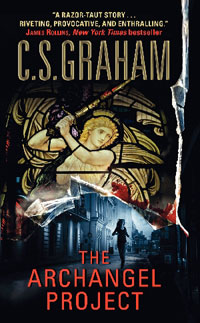

 |
 Steven Harris and Candice Proctor, aka C.S. Graham, talk about writing together, remote viewing, Katrina, and anything else that comes to mind.
Steven Harris and Candice Proctor, aka C.S. Graham, talk about writing together, remote viewing, Katrina, and anything else that comes to mind.
Q. How do two people write one book?
A. There are probably as many different ways of collaborating on a book as there are authors. The method we've developed came about by chance, but it works for us.
Basically, we begin with an idea that excites us. We kick around characters, plot developments, and themes until we're happy with a story's broad strokes. Then we begin to nail down a detailed outline, scene by scene, sometimes even laying down snippets of dialogue. We both do research, with each of us focusing on our particular areas of expertise. Then Candy sits down and writes the book.
We like this approach because it brings both a male and female perspective to the story, which we think is important since we have both a male and a female protagonist. Yet because one person—Candy—does the actual writing, the books maintain a consistent "voice" from one chapter to the next.
Q. How do you handle disagreements in your writing process?
A. Our disagreements are never very serious. When they do arise, we always go with the opinion of whoever's the expert.
For instance, because he spent 21 years in Army intelligence, Steve is the expert on everything from spy tradecraft to weapons systems. When Candy writes a scene and Steve says, "No, they wouldn't do it that way," she rewrites. Candy's the expert on history and, because she's written more than a dozen novels, she's also the expert on things like story arcs, pacing, and character development. If Candy says something like, "If we want him to do xyz, this character needs a much stronger motivation," Steve listens.
Q. Just how authentic are your books?
A. Remote viewing is a very real phenomenon, and many of the scenes in our books are inspired by events that actually happened.
We try to make the books as authentic as we can while still telling an exciting story. The truth is, most intelligence work is incredibly boring—months and months of watching and waiting, interspersed with a few intense moments of activity. Plus, most intelligence work is very much a team effort, whereas novels focus strongly on a few major players. But we do go out of our way to get the details right, whether it's the history of submarine warfare or realistically presenting the way individuals in certain positions interact with one another.
Q. Was Steve a remote viewer in the Army?
A. No. Steve was with the DIA, and was the Army Intelligence Command Liaison Officer at the Army Material Command, then AMC Deputy Director of Intelligence.
In those positions, he worked with reports generated by the Fort Meade remote viewers and spent time at Fort Meade working with the viewers on certain projects. While at INSCOM under General Stubblebine, he was involved in the Army's investigation of neuro-linguistic programming and enhancement projects. At one point the Army did send him to the Monroe Institute to learn how to remote view and have out of body experiences. But Steve never worked as a remote viewer, nor was he ever assigned to the Fort Meade RV section.
Q. Is this going to be a series?
A. It is. We've already written the second book in the series—The Deadlight Connection, an exciting adventure that ranges from Russia to Germany to the Middle East, and involves a missing Nazi U-boat, a Lebanese gunrunner, and an evangelical U.S. Air Force general. It's scheduled for release in September of 2009.
Q. Have you been to all the places you write about?
A. Most of them. Candy lived for many years in various parts of Europe, the Middle East, and Australia, and traveled extensively in Asia and Africa. Steve has lived in Southeast Asia and traveled throughout the Pacific Rim and Latin America and the Caribbean. There are a few places neither one of us has visited, but not many!
Q. I understand you live in New Orleans. How were you affected by Hurricane Katrina?
A. We managed to evacuate to Baton Rouge about twelve hours before the storm hit. Imagine five people and five cats riding out a hurricane and its aftermath in a tiny one-bedroom student apartment without power for a week.
Our house suffered both flooding and roof damage, which brought down the ceiling on parts of the second floor. Fortunately, we didn't get the devastatingly high flood waters that effected so many, but even a foot of water standing in a house for a week pretty effectively destroys everything on the ground floor. For the first month after the storm, we lived in Baton Rouge, driving down every day so Candy could work gutting our house while Steve was busy getting his company reopened. When power and water were restored to Candy's mother's house in Metairie—which fortunately was undamaged—we moved in there.
New Orleans was a crazy place in those days. Few shops were open, National Guardsmen with machine guns patrolled the streets, and we had to drive up to Baton Rouge for groceries (or eat MREs). Because construction crews were almost impossible to find, we did most of the rebuilding of our house ourselves. Candy installed and floated the drywall and painted, and restored her antique furniture, while Steve did the carpentry work on the evenings and on weekends. We moved back into our house in time for the first anniversary of Katrina—although certain details still aren't quite finished.
Q. Since The Archangel Project is set in New Orleans after Katrina, how did the storm affect the writing of the book?
A. The Archangel Project was about half written when Katrina hit. We basically had to shelve the book for a year until we reached the point we felt we had some idea of what the post-Katrina city would be like—remember, at one point they were talking about turning vast swathes of the city into a park. We then had to do a major rewrite, essentially guessing what was going to happen with our city over the next few years. A lot of things we guessed right; some things we got wrong—for instance, the red streetcars on Canal all flooded, so they're still using some of the green streetcars that normally only run on St. Charles; one of the restaurants we mention has reopened, but under another name, etc.. But working on the book after Katrina was in many ways an uplifting experience—it gave us a chance to highlight and celebrate this great city and the way it is coming back.
Q. Have you written other books together?
A. No, although Steve is Candy's plotting partner for her other series—the Sebastian St. Cyr mysteries, a historical mystery series set during the Regency period in England. You can read more about them here.
Q. What is your advice for beginning writers?
A. Read. Read good books and bad books, bestsellers and midlist books, classics and the latest releases. Decide what you like and don't like, and why; what works and what doesn't. Then figure out what's unique about the stories you want to tell.

|
|
|






 |





